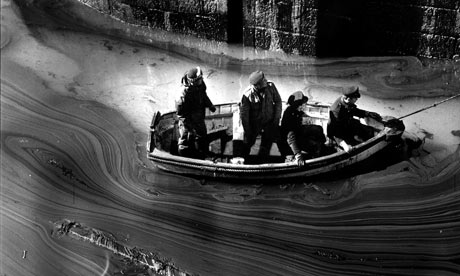
Earth Day came and went this year with little fanfare. Token stories about turning off the lights and cycling to work made their usual rounds in the news media. The 24-hour news networks sent camera crews to schools to watch children sing and make paper signs demonstrating the need for everyone to recycle things like paper. As always, nothing really changes for most people. Just the passing of another single day devoted to all things Earth-friendly – whatever that means – during which the penitent ritually cleanse their sins from the rest of the year. And then at some point in the late morning, news broke about a massive oil spill happening in the Gulf of Mexico.
British Petroleum, the company which “owns” the oil well, reports that 5,000 barrels of oil per day are spilling into the ocean, while independent experts have calculated a rate of flow as high as five to ten times that amount. For the past three weeks, we have all watched as the circus shitshow of BP’s improvised attempts to stop the flow of oil into the Gulf have failed. Their latest effort – a tube which has successfully diverted some of the oil to ships at the surface – is clearly intended to recover oil in order to bring it to market, rather than actually stop the flow of oil into the Gulf.
Meanwhile, efforts to mitigate the environmental disaster have centred upon not allowing the oil to reach the Louisiana and Florida shorelines. The logic in play revolves around the fact that the oil which stays underwater will not threaten anyone’s opinion on BP, offshore drilling, or oil use in general. Nevermind that the real environmental damage occurs under the surface of the water, as the marine ecosystem in the Gulf collapses due to contamination. Or that the Gulf of Mexico is connected to every other oceanic body, to which the oil could spread. In the age of the televisual out of sight is, of course, out of mind.
While many among the talking heads on television enjoyed their own hyperbole about this event having the potential to be the single worst environmental disaster in the history of the United States, the reality is that the Earth has been bleeding like this for decades. The BP oil spill is merely a singularity which makes visible a much larger field of gravity.

Certainly, there are many legitimate concerns about how the spill happened. It is true that the oil industry was able to lobby American lawmakers to the point where lax regulations and an “industry knows best” mentality removed some safety protocols which may have averted or mediated the spill. However, pointing fingers at the companies who successfully sell their products to consumers who want them is misguided. We North Americans are absurdly inefficient in our use of energy. It is our desire for an abundant supply of oil which convinced BP and other oil companies of the benefits of offshore drilling. We must now understand that the blue waters of the Gulf of Mexico are being discoloured by our inability to reduce oil use when alternatives to fossil fuels are increasingly presenting themselves.
In this capacity, it is we who are spilling the oil into the gulf, and we don’t stop there. As an aggregate dynamic, oil consumption is a process of continual spillage. We spill the remnants of oil into the atmosphere after it has been burned for energy, and we spill oil into the landfill after it has been transformed into plastics. The fact that such “spills” are relatively small in terms of each individual allows each of us to justify our mutual environmental disaster as the “normal way of doing things”.
As we get used to an increasing number of wide-scale environmental disasters, the rather ominous prospect arises that we have come to accept disaster as the new normal. In the wake of continual news about environmental damage around the globe, one might say that the BP spill is just another oil spill. Once the spill has been “contained” – an absurd impossibility – we will move on with our days, go for a drive, and buy another soda.
We must understand that humanity now functions as blind gods on Earth. Ours is the Anthropocene era. Our desires produce change which affects the entire planet, and we are engaging in this change without any idea of the consequences. The first conscious change we need to make is rhetorical. Whenever people talk about environmental issues, the phrase “saving the planet” comes up. The problem with this phrase is that it abdicates us from our responsibilities. Most people do not view themselves as heroes who “save” things, but as normal people living normal lives. They ask themselves How can one person make a difference? and so they don’t attempt to change their lifestyle much. Instead of “saving the planet”, we need to strive to “not wreck the planet”. Such a phrase might then allow a person who chooses to drive four blocks to the corner store to view this action in terms of wrecking the planet instead of not saving it.

There is one hope which must be retained, no matter how remote and complicated the scenario presents. Several years ago, BP adopted “Beyond Petroleum” as a new motto for the new millennium. Perhaps after a few more months of oil contaminating the waters which sustain life on this planet, human civilisation will finally understand the sublime and graceful logic of these two simple words.
No comments:
Post a Comment